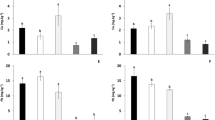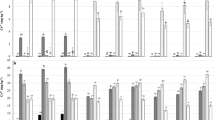Abstract
Soil incubation and germination tests were conducted to assess zerovalent iron (ZVI), organic compost, moisture and their combinations on metolachlor degradation in soil. The ZVI alone degraded 91% of metolachlor in soil within 40 days following bi-phasic kinetics. Organic amendment alone facilitated metolachlor degradation in soil up to 60% after 40 days depending on the amendment rate. However, the combination of ZVI with compost amendment at 30 ton ha−1 and 30% moisture content accelerated metolachlor degradation to 90% after 3 days and 98% after 40 days. The half life (t 1/2) of metolachlor degradation with ZVI, compost at 30 ton ha−1, and 30% moisture was about 1 day, which was faster than ZVI treatment alone and 98% faster than controls. Germination and growth of lettuce (Lactuca sativa) and crabgrass (Digitaria sanguinalis L. Scop.) were severely inhibited in unamended metolachlor-contaminated soils but when these soils were amended with ZVI, germination and growth was comparable to controls (metolachlor free soil). Metolachlor degradation was greatest when ZVI, compost and moisture were used together, suggesting that these treatments will maximize in situ remediation of metolachlor-contaminated soils in the field.




Similar content being viewed by others
References
Aga DS, Thurman EM (2001) Formation and transport of the sulfonic acid metabolites of alachlor and metolachlor in soil. Environ Sci Technol 35:2455–2460
Comfort SD, Shea PJ, Machacek TA, Gaber H, Oh BT (2001) Field-scale remediation of metolachlor contaminated spill site using zerovalent iron. J Environ Qual 30:1636–1643
Delgado-Moreno L, Pena A (2007) Organic amendments from olive cake as a strategy to modify the degradation of sulfonylurea herbicides in soil. J Agric Food Chem 55:6213–6218
Fava L, Bottoni P, Crobe A, Funari E (2000) Leaching properties of some degradation products of alachlor and metolachlor. Chemosphere 41:1503–1508
Furukawa Y, Kim JW, Watkins J, Wilkin RT (2002) Formation of ferrihydrite and associated iron corrosion products in permeable reactive barriers of zero-valent iron. Environ Sci Technol 36:5469–5475
Genin JM, Gourrie G, Trolard F, Abdelmoula M, Jaffrezie A, Refait P, Maitre V, Humbert B, Herbillon A (1998) Thermodynamic equilibria in aqueous suspensions of synthetic and natural Fe(II)–Fe(III) green rusts: occurrences of the mineral in hydromorphic soils. Environ Sci Technol 32:1058–1068
Giovanni D, Accinelli C, Vicari A, Catizone P (2000) Comparison of the persistence of atrazine and metolachlor under field and laboratory conditions. J Agric Food Chem 48:3037–3043
Graber ER, Dror I, Bercovich FC, Rosner M (2001) Enhanced transport of pesticides in a field trial treated with sewage sludge. Chemosphere 44:805–811
Kim SJ, Yang JE, Oh SE (2007) Kinetics of metolachlor degradation by zero-valent iron. Korean J Environ Agric 26:55–61
Kolpin DW, Thurman EM, Linhart SM (2000) Finding minimal herbicide concentrations in ground water? Try looking for their degradates. Sci Total Environ 248:115–122
Novak SM, Portal JM, Schiavon M (2001) Effect of soil type upon metolachlor losses in subsurface drain. Chemosphere 42:234–244
Rouchaud J, Gustin F, Cappelen O, Mouraux D (1994) Pig slurry and cow manure effect on atrazine and metolachlor soil biodegradation in maize. Bull Environ Contam Toxicol 52:568–573
Sanchez-Camazano M, Iglesias-Jimenez E, Sanchez-Martin J (1997) City refuse compost and sodium dodecylsulphate as modifier of diazinon leaching in soil. Chemosphere 35:3003–3012
Sanchez-Martin MJ, Crisanto T, Lorenzo LF, Arienzo M, Sanchez-Camazano M (1995) Influence of leaching rates on 14C metolachlor mobility. Bull Environ Contam Toxicol 54:562–569
Satapanajaru T, Comfort SD, Shea PJ (2003a) Enhancing metolachlor destruction rates with aluminum and iron salts during zerovalent iron treatment. J Environ Qual 32:1726–1734
Satapanajaru T, Shea PJ, Comfort SD, Roh Y (2003b) Green rust and iron oxide formation influences metolachlor degradation during zerovalent iron treatment. Environ Sci Technol 37:5219–5227
Senseman SA, Lavy TL, Mattice JD, Gbur EE, Briggs WS (1997) Trace level of pesticide detection in Arkansas surface waters. Environ Sci Technol 31:395–401
Shea PJ, Machacek TA, Comfort SD (2004) Accelerated remediation of pesticide-contaminated soil with zerovalent iron. Environ Pollut 132:183–188
Singh N (2003) Organic manure and urea effect on metolachlor transport through packed soil columns. J Environ Qual 32:1743–1749
Weber EJ (1996) Iron-mediated reductive transformations: investigation of reaction mechanism. Environ Sci Technol 30:716–719
World Health Organization (1993) Guidelines for drinking-water quality, vol 1, 2nd edn. World Health Organization, Geneva
Worrell F, Fernandez-Perez M, Johnson AC, Flores-Cesperedes F, Gonzalez-Pradas E (2001) Limitations on the role of incorporated organic matter in reducing pesticide leaching. J Contam Hydrol 49:241–262
Acknowledgments
This research was supported in part by a grant from the Research Institute of Agricultural Science, Kangwon National University, Korea.
Author information
Authors and Affiliations
Corresponding author
Rights and permissions
About this article
Cite this article
Kim, SC., Yang, J.E., Ok, Y.S. et al. Accelerated Metolachlor Degradation in Soil by Zerovalent Iron and Compost Amendments. Bull Environ Contam Toxicol 84, 459–464 (2010). https://doi.org/10.1007/s00128-010-9963-6
Received:
Accepted:
Published:
Issue Date:
DOI: https://doi.org/10.1007/s00128-010-9963-6




